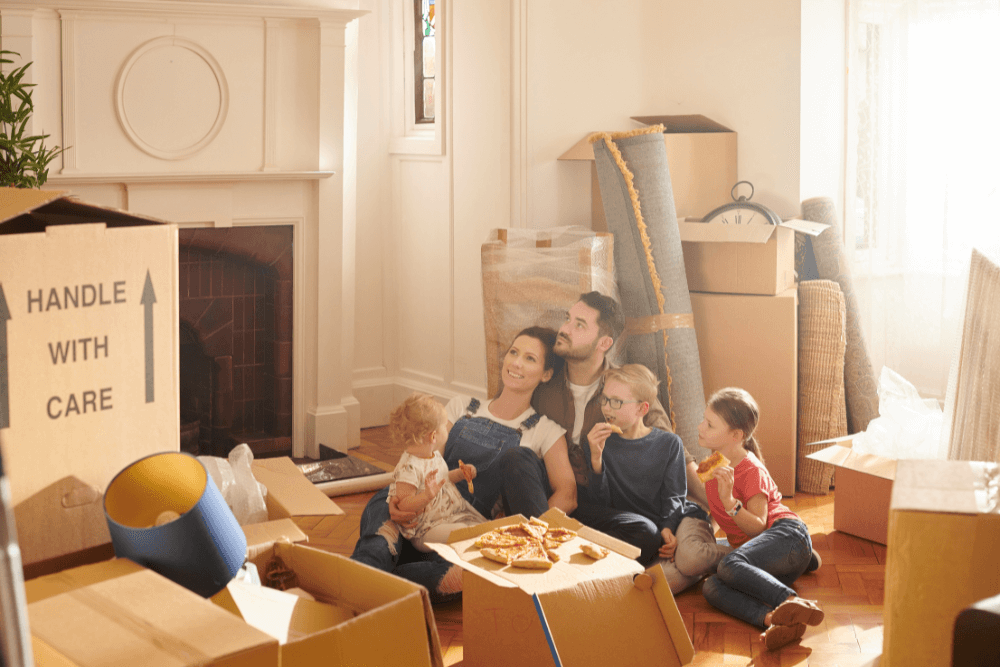How do moving house affect children? 5 easy tips to make this change a positive one
Moving house involves much more than "moving four walls": and for children it can be a real emotional rollercoaster.
Between the excitement of the new and the attachment to what is left behind, the youngest children live an experience that can be difficult and must be recognised, accompany and turn it into something positive.
Today we will tell you how removals affect childrenWhat can happen and how to turn the move into something enriching for them.
Moves and emotions: how children feel about moving house
The change of home touches many buttons: new routines, unfamiliar surroundings, friendships that are sometimes left behind? All this matters, and not only for adults.

For children, moving house can mean feelings that they may not be able to express. In addition, the age of the youngest children has a great influence and can affect them in very different ways:
-
Young children (0-5 years): may become more clingy than usual, become more irascible or even regress in certain behaviours or learning (e.g. bed-wetting)..
-
School-age children (6-12 years): As they become more aware of the change, they often ask themselves questions such as: "What about my friends?" "What about school?" Questions that, if they are not worked on, end up turning into insecurity, anxiety, difficulty in concentrating or lack of motivation.
-
Adolescents (13+ years): This stage is key for children to feel a sense of belonging, identity, and inclusion in their friendship groups.
A move can feel like a "reset" that they view with suspicion, leading to frustration or isolation in their day-to-day lives and possible conflict with parents.
So the key here is clear: it's not just about moving houseis to change what for them is their world.
Seeing the signs that your child needs support during the move
But not all children may feel this way during a move, the question on everyone's mind is almost always the same: If they need support, How can I detect it?
Detecting the signs early can make the difference between going through the motions and experience it as something that will have a positive impact on them..
Here are some signs:
- It changes your sleep (she tells you she has more nightmares, wakes up often) or appetite (she eats a lot or hardly eats at all).
- Becomes more irritable or cries for no reason.
- Backsliding on skills already mastered (sphincter control, sleeping alone).
- Has difficulty socialising or integrating into the new environment, avoids talking about change.
- Talks a lot about the "old home" or shows rejection of the new environment.
- Argues a lot at home, is quick-tempered or starts to be confrontational at school or college.
- Loses motivation for hobbies or withdraws from them.
These small signs can be a wake-up call for you to act with calm, presence and listening.
Strategies to help children adjust to moving house
If you have detected any of these signs or changes, or if you want to prevent it and turn the experience into something positive from minute 1, here are some ideas and tips to help you achieve this:
Involve them in the process
Make the move something with them, not something that happens to them that they cannot control.

Let them choose the decoration of their room, which will pack some toys or who participate in a mini-list of "things you will take to the new house". help them feel that they have a voice and are part of the move.
Maintain stable routines
However much the environment changes, the family "rhythm" can be maintained.
However, it may be more difficult for you to juggle it during the time of the move, maintaining your routine is very important.
Bedtime, snack time, reading or playtime... These routines are moments of safety and security that help the child not to feel that everything is falling apart or changing completely.
Positivise the farewell
Although it may sound a bit dramatic, for children, such a major change sometimes feels like a loss. and so working with them on this change in the same way can help them a lot.
Visiting their old school, going to the park they used to love from time to time or being able to tell their friends themselves that they are moving, allows them to say goodbye to the familiar.
And this "closure" will help the move start with fewer loose ends.
Explore the new home with them
Whether you are younger or older, bringing out your fun side and making a game out of the new home will make everything easier.

If they are very small, have a Gymkhana around the house, going out to play in the street and the new park or start with them to do the day-to-day shopping in the shops in the new area, will make them feel more comfortable and will make them feel positive about the change.
Constant communication
As with many other aspects of childhood and adolescence, that your children can trust you and tell you how they feel. or worry will make the whole process of change much, much easier.
Thus you can explain to them that it's OK to miss home or their old school.It can be a lot of fun to get excited about what's new, or that it's OK if you have to be a bit more patient for the first few weeks.
Moving is not just about "carrying boxes", is to accompany emotions, experiences and above all changes.
Children will feel, question and experience the move in their own way, but with these tips you can turn it into something positive and enriching so that they get off to a good start in their new home.
And while you listen and help your children to make the move a good experience, at Gil Stauffer we can help you to make moving all your belongings and starting to live in your new home a simple, comfortable and stress-free process.




